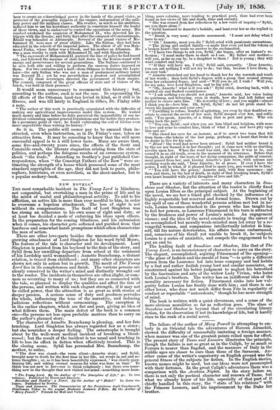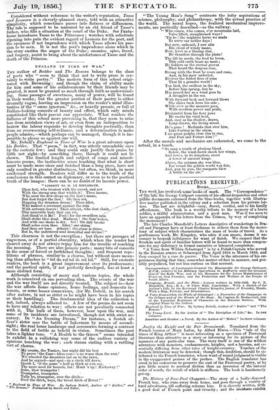NEW rrovsLs.* THE most remarkable incident in The Young Lord
is blindness, not congenital, but overtaking a man in the prime of life and in the midst of useful and philanthropical activity. To add to his affliction, an active life is more than ever needful to him, in order to overcome a hopeless attachment The loss of sight is not without its compensations. The fault of Lord. Singleton was too strong an adherence to his own sense of right and duty, or at least too decided a mode of enforcing his ideas upon others. In the preparation for the coming blindness, and his submission when it comes, his character gets softened and purified from that hardness and somewhat harsh promptness which often characterize the man of action.
There are other love-parts besides the unconscious and slow-
owing attachment of -1..ord Singleton for his ward Sybil Moore. The feature of the tale is character and its development. Lord Singleton is painted from his boyhood to the finis of the story, and Sybil from her unwilling departure from school at the command of his Lordship until womanhood; Anisette Beauchamp, a distant relation, is traced from childhood ; and many other characters are shown not only in action but in growth. The me/it of The Young Lord lies in its completeness and finish. The various persons are clearly conceived in the writer's mind and distinctly wrought out to the reader. The incidents in themselves are often slight, or com- mon as occurring to many of us ; but they are so connected with the tale, so planned to display the qualities and affect the fate of the persons, and written with such elegant strength, if it may not he called power, that the attraction is as great as with stories of deeper passion. A serious sense of duty and goodness pervades the whole, influencing the tone of the narrative and inducing iudicious reflections without sermonizing. The exception is in. the earlier chapters, which are flat and poor, giving no idea of what follows them. The main defect of the book is a common one—the persons act less upon probable motives than to carry on the author's planned story. The character of Annette Beauchamp is pleasing, and her fate touching. Lord Singleton has always regarded her as a sister ; but she nourishes a deeper feeling.. The catastrophe is brought about by the well-worn medical incident of breaking a blood- vessel ; but the result of the incident is too usual and touching in life to lose its effect in fiction when effectively treated. This is the closing scene. Sybil has persuaded Mrs. Beauchamp, the
mother, to retire.
"The door was closed—the room silent—Annette slept i and Sybil, brought near to death for the first time in her life' sat wrapt in sad ana so- lemn thoughts ; or, as it has been beautifully expressed, was closely ques- tioning life, and asking eternal reasons for what was done in time.' To think was not new to her—nor to think religiously ; but there was some- thing new in the thought that now visited her mind—something more hum- * The Young Lord. By the Author of 'The Discipline of Life," fe. In two volumes. Published by Hurst and Blachett. Sunshine and Shadow : a Novel. By the Author of "Mabel." In three vo- lumes. Published by Newby. Tasso and Leonora. The Commentaries of Set. Pantaleone degli Oambacorti, Gentleman Usher to the august if-ado:ma Leonora D'Bste. By the Author of "Mary Powell." Printed for Hall and Virtue.
bling, more calming, more tending to practical good, than had ever been found in her views of life and death, time and eternity. "She was roused from her reflections by a low voice of inquiry—' Sybil, are you there alone ?' Sybil hastened to Arurette's bedside, and bent over her as she replied to the question. " Death is very near,' Annette murmured. I must not delay what I have to say.'
" Oh ! .Annette, must you die ?' Sybil cried with passionate earnestness. "The dying girl smiled faintly—a smile that even yet had the tokens of a broken heart—but made no answer to the exclamation.
" ' I have two things to ask you, Sybil,' she began, after an instant's re- flection; I must make them as short as I can. My father and mother— will you, as far aa can be, be a daughter to them ? Zoe is young ; they will want comfort and help.' " ' If they will have me I will,' Sybil said, earnestly. Dear Annette, you can ask nothing I will not try to do ; but this, because I love them, is an easy task.'
"Annette stretched out her hand to thank her for the warmth and truth of her words ; then held Sybil's fingers with a grasp that seemed strange from her exhausted frame, and said—' Will you do all I 'wish? Will you, for my sake love Lord Singleton, and be his wife ?'
"'Oh, Almette ! what is it you ask ? ' Sybil cried, drawing back, with a startled air and flushed countenance.
" ' I ask nothing you should not grant,' Annette said, her voice losing its quietness, and betraying, even in death, how she had left father and mother to cleave unto him. He is worthy of love ; and you might—almost I think you do—love him. Oh, Sybil, Sybil ! do not let pride stand be- tween his happiness and your own.' "Unwilling to refuse, tearful of agitating, yet even by that deathbed re- solute to conceal the secret of her soul, Sybil stooped over her, and softly said, 'You speak, Annette, of a thing that is past and gone. Who can bring back the past ? '
"'You can, Sybil ; and when you see him blind and helpless, with none to love and none to comfort him, think of what I say, and have pity upon him and me.'
"She closed her eyes for an instant, as if to arrest two tears that fell from them—the tokens of the last pang, perhaps, of a heart that broke in its desire to live for his sake.
"Blind.' the word had never been uttered : Sybil had neither heard it by the ear nor framed it in her thought ; yet it came now with no startling novelty upon her. When the word was said, she knew it was to be, and owned it as an old truth, even in the moment of its utterance. Before that thought, in sight of the tears of her dying companion, the pride of conceal,- ment passed from her, and, kissing Annette's pale brow, with solemn and soothing words she said, Dear Annette, be at peace. If ever I have the ponrireIuvo,iylliubeh:vhae td it pleased God toyou, would be to Inni:en:;
then and there, by the bed of death, in sight of that breaking heart, Sybil's own heart bounded with joyful thoughts of love and life."
There are a variety of interests and many characters in Sun- shine and Shadow, but the attention of the reader is chiefly fixed upon Louisa Elton as the principal subject. At the beginning of e novel, we see her a timid girl checked by the influences of a highly respectable but reserved and formal home. Drawn out by the spell of one of those wonderful persons seldom met but in no- vels,Zonisa becomes attached to the person who has taught her to feel her powers, as Laurence Fitzormond in his turn is attracted by the freshness and power of Louisa's mind. An engagement ensues; and the idea of the novel consists in tracing the career of an accomplished but morally weak-minded man led away by a re- vengeful woman and companions intellectually inferior to him- self, till his nature deteriorates, his affairs become embarrassed, and, conscious of his thrall yet unable to break it, he subjects Louisa to a series of anxieties, and compels the engagement to be put an end to.
The leading fault of Sunshine and Shadow, like that of The Young Lord, is an inconsistency of character to carry on the story. The elegant, accomplished, aspiring Fitzormond of the opening- " the glass of fashion and the mould of form "—is quite a different person from the Laurence led into loose company and bad habits by a fast and rather foolish young lord and similar associates, or constrained against his better judgment to neglect his betrothed by the fascination and arts of the widow Lady :Vivian, who hates both Louisa's brothers. The writer has an indifferent idea of the morality necessary for fiction. Fitzormond sinks into low vul- garity before Louisa has finally done with him ; and there is an- other lover, who does not much differ from Fitz in regularity of conduct or repectable "antecedents," though he has more strength of mind..
The book is written with a quiet cleverness, and a sense of the more obvious moralities as far as reflection goes. The class of Sunshine and Shadow is beyond that of the circulating library fiction, for its observation if not its knowledge of life, but it hardly rises to the rank of a social novel.
The failure of the author of Mary Powell in attemp • to em- body in an Oriental tale the adventures of Haronn showed the difficulty of successfully imitating a foreign manner, when manner was one of the greatest points relied upon for effect The present story of Tasso and Leonora illustrates the principle, though the failure is not so great as in the Caliph, by as much as Ferrara is nearer than Bagdad, and the manners of Italy in the middle ages are closer to ours than those of the Saracens. An- other cause of the writer's superiority on English ground was the general fitness of the subjects for fiction. In the English stories, known names might be used, but our ideas were not preoccupied with their fortunes. In the great Caliph's adventures there was a comparison with the Arabian Nights. In the story before us, there is not only the poetical character and renown of Tasso, but what we already know of his life, especially of that part of it chiefly handled in this story, the "state of his relations" with the Princess Leonora, and, his imprisonment by the Duke her brother.
Considered without reference to the writer's reputation, Tasso and Leonora is a cleverly-planned story, told with an attractive simplicity, which sometimes passes into flatness or diffuseness. The tale is supposed to be narrated by an old friend of Tasso's father, who fills a situation at the court of the Duke. Ser Pante- Leone introduces Tasso to the Princesses ; watches with solicitude ripening into pain the evident regard of Leonora for the poet, and the openness if not imprudence with which Tasso allows his pas- sion to be seen. It is not the poet's imprudence alone which in the story excites the anger of the Duke ; enemies, spies, fraud, and forgery, assist to bring about the misfortunes of Tasso and the death of the Princess.



























 Previous page
Previous page